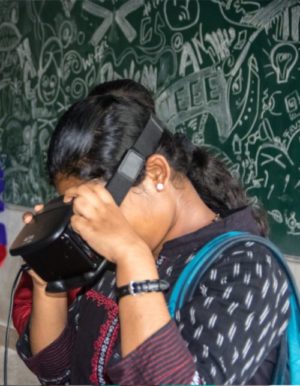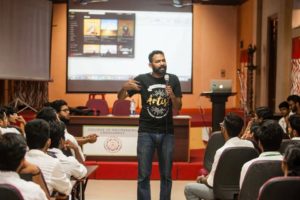The IEEE Computer Society College of Engineering Chengannur Student Branch Chapter Creates a Developer Community for Students

Too often, students race through secondary school, compiling tallies of courses and credits, joining activities to lengthen their resumes, and taking (and retaking) entrance exams. These same students arrive at college only to repeat the process, hoping to enter a graduate or professional school, or to land that perfect first job.
We live in a goal-oriented society in which becoming a thoughtful, lifelong learner — instead of an educational trophy-hunter — is not an easily achievable state of mind. These are the revelations that led our Chapter at the College of Engineering Chengannur to form Devcom (Developer Community), a group of students that encourages technical-skill-sharing and companionship.
The First Rumblings of Community
The idea for Devcom first began in 2013. This “batch” (2016) started as a group of four students (now a family of more than 80), who yearned to elevate all students technologically.
We developed a peer-to-peer learning system, where each member of the community shared the content he or she knew best, and we have mentors in the community who could help members at any time.
We believe that empowering students with technology can unleash their creativity.
Activities
Early on, Devcom conducted the Hall of Code, and then organized sessions and workshops. Our activities began with biweekly sessions and tasks, but the community rapidly accelerated to weekly sessions, which made learning a consistent process.
Devcom devotes a complete week for each topic, with dedicated sessions or discussions throughout the week. One of the seven Guilds, topic-based teams, conduct each of the week’s events, taking complete responsibility for the week—from organizing the event to submitting the final report.
Currently, the third Devcom group has started with 12 members and weekly sessions are organized in a dedicated room. We have completed more than 20 sessions is the past year and have completed more than 50 projects (Software, Design and Video)—a number that is constantly increasing because the students are no longer afraid to try.
Mr. Sanjay Vijayakumar, Chairman, Startup Villiage Collective (SV.CO) describes the initiative and its team: “The Devcom at the College of Engineering Chengannur and its Team Lead Sooraj have done exceptional professional work and have impressed me with both passion and execution; rare qualities that come even rarer together in today’s world.”
In addition to sessions and projects, we choose a specific topic to learn all week long under the “WEEKS” initiative.
Shan Eapen Koshy, technical blogger, webmaster of the IEEE Student Branch CEC and Devcom participant explained, “Devcom weeks have given me an overview of the various new technologies that I wouldn’t have known otherwise.”
 Challenges and Advice for Chapters Seeking to Create a Devcom
Challenges and Advice for Chapters Seeking to Create a Devcom
Planning a development community is easy, but seeing those plans to fruition is much more challenging.
To help Chapters create their own Devcom’s, here are a few challenges we have faced (and their solutions):
Gathering people who believe in the community and for each of them to be active—It can be a challenge attracting members at first. Word of mouth was our best support. And once these people took part in activities, the quality experiences and benefits integrated these people into our family.
Space—Initially, we conducted meetings in college corridors and classrooms. Then as members increased and the team lead introduced the idea of sessions, we shifted to the IEEE Centre of Excellence, which often faced scheduling conflicts with IEEE Student Branch meetings. Recognizing the importance of our activities, Dr. Smitha Dharan, Head of the Computer Science Department granted us a room for activities.
Resources—As we decided to increase the efforts of the community through constant and regular sessions, we were at a disadvantage: for each session we needed internet connectivity and projector. And each time, permission had to be taken, followed by a tiresome set of procedures. But it was then that Dr. Smitha Dharan (HOD Computer Science Department) recognized our efforts gave us the permission to take the necessary resources when needed.
Skill and Expertise—Although proposed as a community of technically capable students, in reality, Devcom began with only a handful of members who matched that description. However, what we didn’t have, we built. We encouraged members to take up sessions of relevant topics in which they were less than expert. To conduct the session, they had to study the topic in depth. The members were given free online courses, projects and textbooks. And slowly they became the experts the community needed.
Sustainability
The best thing about creating a developer community is the fact that it is highly sustainable through its costs and its self-replication. Sessions are essentially free, since the members are the ones who organize and lead them. And the sessions nurture a culture of peer learning, which results in the development of new session leaders each year.
Chapters will find that professionals and alumni have a keen interest in conducting workshops and technical sessions for the community members.
For help or guidance in forming Devcom, contact at: soorajparakkattil@ieee.org.
This article was submitted in a longer form by Devcom and can be viewed at http://cecieee.org/devcom-walk-through/.


Leave a Reply